Dentures – Worcester, MA
A Reliable Solution for Patients with Multiple Missing Teeth
Dr. Joseph Costa offers multiple options for replacing missing teeth, including dentures in Worcester. Back in the day, dentures used to look bulky and fake. Fortunately, that’s no longer the case. Today, cosmetically pleasing dentures can provide a natural-looking smile that will feel comfortable and restore your mouth’s full function after tooth loss. Want to learn more? Then schedule a consultation with us or keep reading!
Why Choose Dr. Joseph Costa Family Dentistry for Dentures?
- Dentist Who Trained at the Prestigious Dawson Academy
- Dental Insurance and Flexible Financing Available
- Dental Team Focused on Delivering Exceptional Customer Service
Who's a Good Candidate for Dentures?

If you are missing a few teeth in a row, there are several gaps throughout your smile, or you don’t have any of your natural teeth left, then you know all too well how difficult it can be to smile confidently, chew efficiently, and enunciate clearly. That’s why we offer dentures. Decades prior, these restorations were bulky and obvious. Today, they are lifelike, durable, and comfortable! If you’re interested in learning if you’re a good candidate for this tooth-replacement solution, then give our team a call or read on.
Effects of Missing Teeth

It is essential to replace lost teeth as soon as possible to prevent the development of additional dental problems and preserve the aesthetics of your natural smile. In addition, missing teeth can lead to changes in your oral health, such as gum disease, bone loss, jaw shrinkage, and shifting teeth. So, if you are struggling with tooth loss, don’t wait to schedule an appointment with our Worcester dental team. From there, we can learn more about your unique dental needs and smile goals to determine if dentures are the best tooth-replacement solution for you!
What Qualifies You for Dentures?
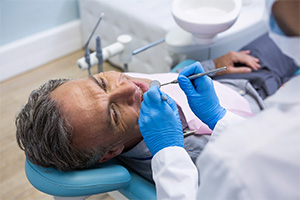
Since dentures are versatile, they can help patients who are missing only a few teeth or who are missing an entire arch. So, if you’re a part of the 178 million Americans who are struggling with tooth loss, it’s worth scheduling a consultation with our Worcester dental team! At your appointment, we will ask you a few questions to learn about your medical and dental history, complete a comprehensive oral exam, and determine if dentures are the best tooth-replacement solution for you. If they are, then we will pinpoint which one you need (i.e., fill, partial, or implant-retained) and begin working on your treatment plan.
Alternative Tooth-Replacement Options

If you aren’t a candidate for dentures, don’t worry – that doesn’t mean you have to live with noticeable gaps in your smile moving forward. Instead, we will review the other tooth-replacement options available to you, including:
- Dental bridges – Dental bridges are used to replace one missing tooth or several missing teeth in a row. This restoration can be anchored in place with dental crowns or dental implants; the one we recommend will depend on key factors like the density of your jawbone.
- Dental implants – Dental implants are unique because they replace the root and visible structure. As a result, they stimulate your jawbone, preserve your youthful face shape, allow for a more varied diet, and can last for 30 years or more with proper care.
If you are ready to find out if you’re a candidate for dentures (or any of the other smile-rebuilding services we listed above), then schedule a consultation with us!
Types of Dentures
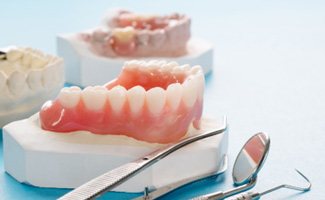
As mentioned above, you now have a variety of choices to choose from when considering dentures. We offer three types of dentures, which can be either removable or fixed:
Partial Dentures
As the name suggests, a partial denture replaces several missing teeth while preserving the remaining natural teeth you have. Partial dentures can be secured either by a dental implant or by a natural tooth strengthened by a dental crown.
Full Dentures
A full denture replaces the top or bottom rows of teeth. They are crafted by a skilled technician using the latest dental technology, and they are held in place with natural suction, denture adhesive, or a mixture of the two.
Implant Dentures
This option is a full denture that sits on four to eight dental implants, in most cases. Your new denture will be permanently secured with several strategically placed dental implants. This option has the least amount of food restrictions and does not require the use of denture creams.
The Benefits of Dentures
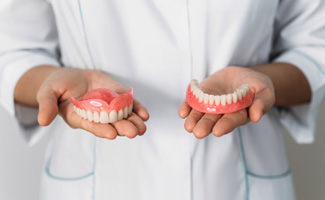
Dentures are a tried-and-true dental restoration that has assisted countless patients suffering from tooth loss – and people continue to turn toward them for all of their incredible, life-changing benefits. Not only are patients able to smile with confidence and enjoy a full set of functional teeth, but daily life will become noticeably easier and more enjoyable in many ways. Here’s a closer look at some of the specific benefits that dentures have to offer.
Psychological Benefits

Losing teeth can have a major impact on your self-esteem; in fact, many people with missing teeth also end up experiencing increased social anxiety, sadness, and depression. However, when you opt to wear dentures, you won’t have to worry about how you look when you eat, speak, or smile. These prosthetics are incredibly lifelike and operate just like natural teeth, allowing you to engage in social activities once more with increased confidence.
Clearer Enunciation

Your teeth play a very important role in speech, so needless to say, any number of missing teeth can drastically alter how you converse with others, making certain sounds difficult to pronounce properly. Since dentures restore your whole smile, they also revive your ability to enunciate clearly. Though it might take a little practice at first, once you learn how to speak with your dentures, you won’t even notice a difference in how you sound!
Improves Nutrition

Tooth loss negatively impacts the types of food you’re able to eat, and some foods might be impossible to chew, let alone swallow, without a full set of teeth. Plus, if you’re unable to chew your meals, you might experience problems including malnutrition and indigestion – it’s also a choking hazard! Dentures are designed to operate just like your natural teeth, allowing you to bite, chew, and tear different types of foods from a varied diet.
Preserves Oral Health
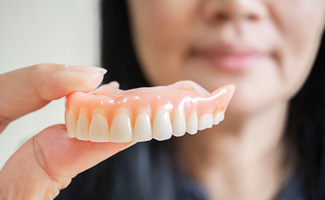
Missing teeth is not solely an aesthetic issue – it greatly affects your oral health. As teeth are lost, nearby ones can shift out of place or fall out themselves. Plus, the areas in the jaw below the gaps will suffer from bone resorption, since they’re no longer receiving stimulation from the lost tooth’s roots. These complications can be somewhat mitigated by wearing dentures, as the restorations support the positions of the rest of the teeth while bearing more of the brunt of the force of chewing.
Expands Opportunities

Most people agree that the very first feature they notice upon greeting someone is their smile – meaning having a full set of teeth can go a long way in the professional world. In fact, recent studies have even shown a pattern between poor oral health and a lower probability of being employed. This means that dentures could quite literally open all sorts of doors to new opportunities! Not to mention, when it comes to personal relationships, having a complete and beautiful smile can help you express yourself and stay confident.
Understanding the Cost of Dentures

Navigating the cost of any dental treatment can be difficult on your own. That’s why our team at Dr. Joseph Costa Family Dentistry is here to help every step of the way – from your first phone call to your final appointment. We’ve even dedicated this next section to reviewing some of the factors that impact the cost of dentures. So, you can read on to learn more too!
Factors That Affect the Cost of Dentures

At your consultation with Dr. Joseph Costa, he will determine the following:
- The number of teeth that need to be replaced – Typically, it costs more to address moderate to severe cases of tooth loss.
- If any preparatory treatments are needed – Sometimes, preliminary services are needed, like tooth extractions and gum disease therapy.
- What materials will be used to make your restoration – Although there are cheaper materials, we want to use one that is aesthetic, comfortable, and durable.
- The type of denture you want – In addition to traditional dentures, we offer implant-dentures, which provide additional stability.
Are Implant Dentures More Expensive?

Usually, implant dentures are more expensive because they require oral surgery. That’s not to say, however, that they aren’t a good investment. Quite the opposite! Since dental implants can last for 30+ years, they often end up being the best choice for your wallet in the long run. Plus, there are countless other benefits, like the fact that they preserve your jawbone (and your youthful facial structure). If you’re a bit unsure whether or not implant dentures are right for you, don’t hesitate to talk to our team about this state-of-the-art tooth-replacement solution at your consultation.
Does Dental Insurance Cover Dentures?
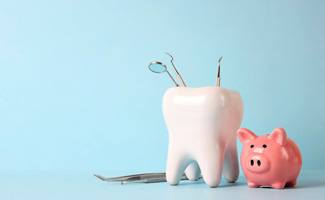
Since dental insurance plans are unique, there isn’t a one-size-fits-all answer. With that said, essential restorative services, like dentures, typically are covered in part. Of course, there are also waiting periods, yearly deductibles, and other factors to consider, which is why we encourage our patients to familiarize themselves with their benefits. Our practice is also dental insurance-friendly, so if you have any questions about how your coverage pertains to the treatment you’re interested in, we can help!
Dentures FAQs

At your appointment, you’ll sit down one-on-one with Dr. Costa, and he will answer any questions you have about dentures before you leave. However, if you want to do more research online before your visit, we completely understand. That’s why we dedicated this next section to FAQs!
When Should I Replace My Old Dentures?
As a rule of thumb, dentures should be replaced every five to ten years. They are not meant to last forever! Your mouth and jawbone change over time, so keeping your restorations in good condition are important. The older your dentures get, the more likely they will become less comfortable and not fit like they used to. Get your dentures checked at the dentist if they are causing gum irritation and other issues.
Do Dentures Hurt?
Dentures are bulky in the mouth and will take some time to get used to. However, they should never hurt. Properly fitted dentures should not cause you any issues. Please schedule an appointment immediately if you have an uncomfortable denture that creates mouth sores. It may need an adjustment or replacement.
How Do Dentures Stay in Place?
This depends on what type you have. A partial denture uses clasps made of metal or acrylic that will snap around existing teeth. A full denture relies on a layer of saliva between the gums and base to create a suction effect. Dental implants can also secure the denture. This is the most secure option. Dentures secured by dental implants will not move around in the mouth and will allow you to eat a diet with little to no restrictions.
